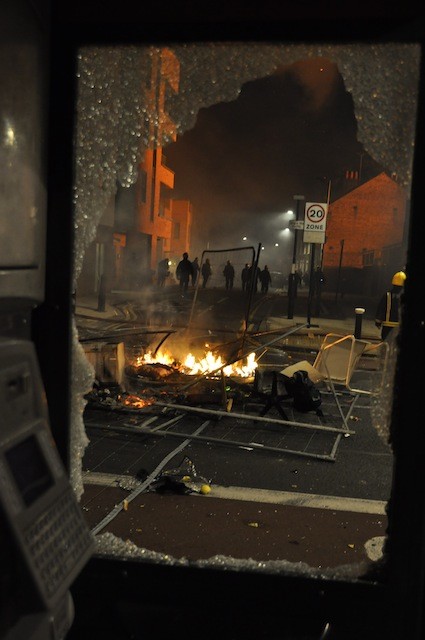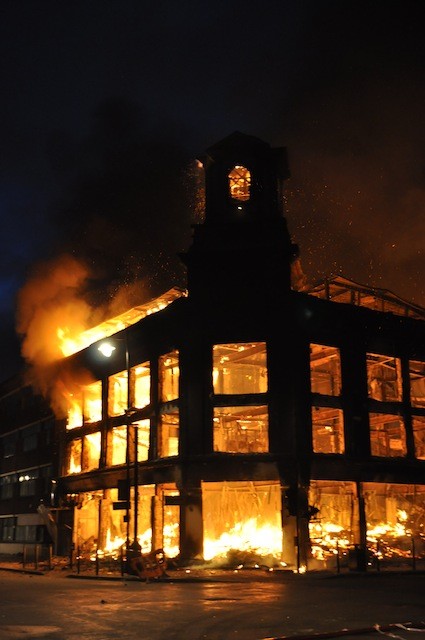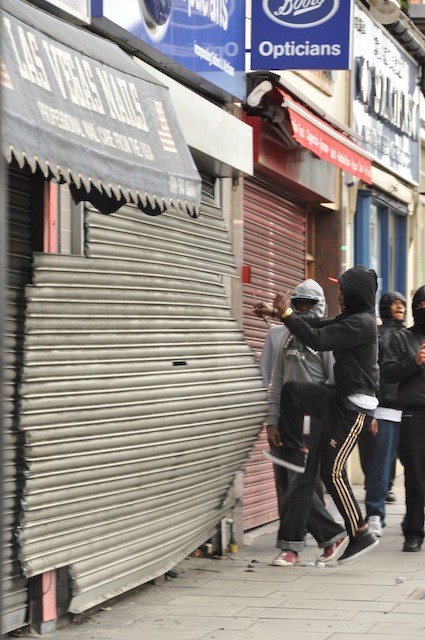One year ago this weekend, Britain exploded into the worst rioting that pretty much anyone living there can remember. Four days of intense violence, looting, and chaos caught the police off-guard and politicians flew home from their expensive holidays to try to deal with the mess. The violence started on the 4th of August after police shot dead 29-year-old Mark Duggan as he travelled in a taxi through Tottenham, North London. The officers claimed they thought Duggan was a threat, but it was later established that, while Duggan did have a gun, it was never pointed at police and was still sheathed in a sock Duggan was using as a makeshift holster. Eventually, IPCC ballistics reports also confirmed that a bullet lodged inside a police radio was shot from a police-issue firearm.
Advertisement
Duggan's family weren't aware of that when they held a protest march to Tottenham police station two days later. Senior officers refused to meet the crowd and provide the answers the community were demanding, and when rumors started that a police officer monitoring the protest had assaulted a young girl, the crowd got angry. The clashes that followed lit a spark that traveled the length and breadth of the UK, as protesters with long-term grievances and opportunistic looters and arsonists jumped the Olympic gun by a year and used the general sense of disarray to plot their own anarchic torch route.
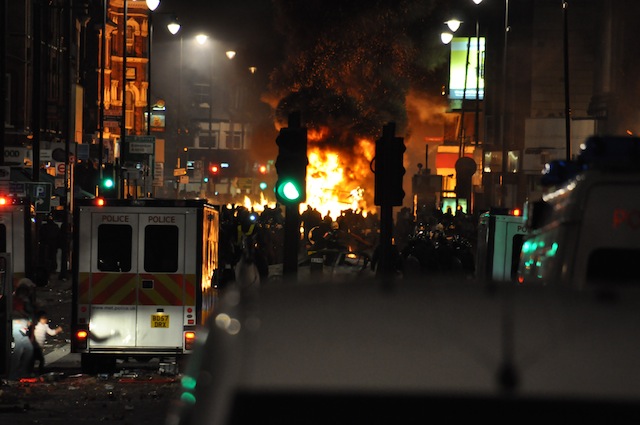
I arrived on the scene a few hours after the Duggan protest had turned violent to find Tottenham High Road blockaded by police and illuminated by a burning double-decker bus. I managed to skirt the police lines and find the angry locals who were facing off with riot cops further up the street. At this point waving around an expensive camera was a bad idea; I'd got wind of talk that other photographers had already been attacked and so I spent a lot of time just watching the crowd.I've covered civil unrest and rioting all over Europe and the UK, but this was different. The fact that it was birthed from a very spontaneous and personal sense of grief, by people who likely had no riot experience, made things very unpredictable. And then of course there was the basic severity of it all, practically unheard of among a generation of British kids who many had assumed to be sullen and pissed off but ultimately apathetic.
Advertisement
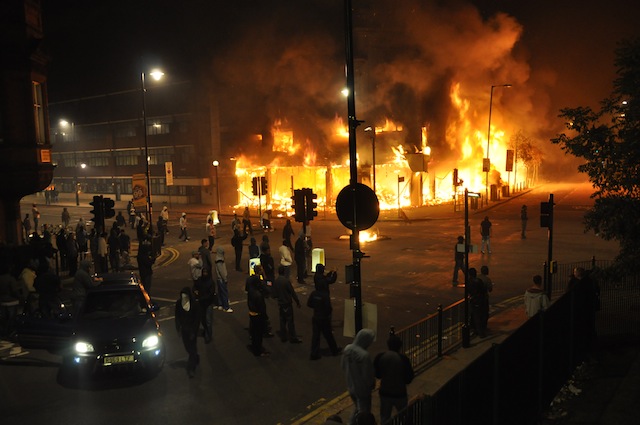
As time went on, more buildings were set alight as police pushed the rioters back. Shops were broken into, some for carry-home loot, while others were raided for potential weapons to fight the police with. At one point, I saw some kids break into a work van and take out some shovels and pickaxes before running at the police, with their new weapons swinging in the air. At another, I saw a Post Office broken into and the sweets and chocolate handed out by new-age Robin Hoods. The crowd was fearless and at times clueless, not even bothering to cover their faces when the police helicopter came to take everyone's photo. At around 4 AM the police had managed to disperse the crowd, but I remembered something said to me by one of the rioters: "With us kicking off here tonight, just wait, Hackney will be next."
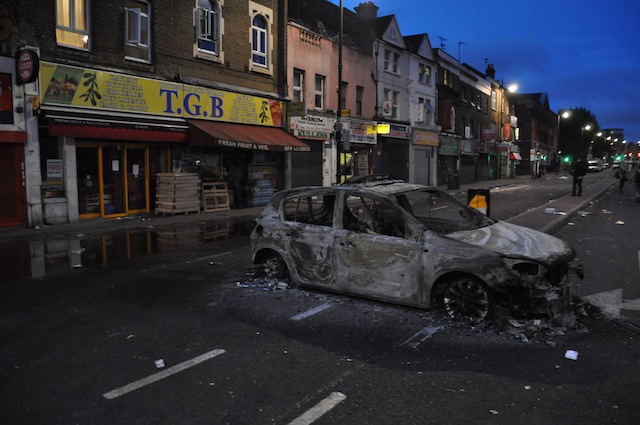
The next day, the police were surprised by a small outbreak of looting in Enfield and Wood Green. They, like most other people, had assumed that what happened in Tottenham was a local incident, there wasn't much anticipation of the rioting spreading. But spread it did, and on the Monday a ton of people on Twitter were talking about a gathering in Hackney.
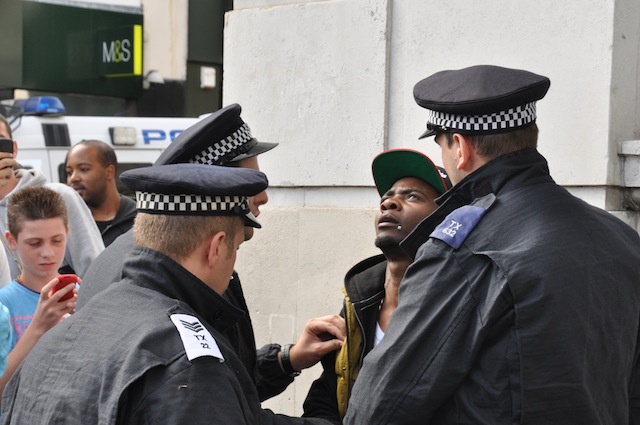
After running around East London for a while, I found a large crowd on Mare Street. For some reason, the police decided to stop and search two black guys seemingly at random, highlighting the racial profiling that has been driving a wedge between the authorities and ethnic minorities for decades and contributed to the unrest in Tottenham. The police found nothing but their actions had wound up the crowd, and when they pulled another young kid aside for a pat down, someone lobbed a paving slab at them.
Advertisement
The cops put on their Nato riot helmets but were surrounded and cut off from their vehicles, which were quickly trashed. Shops were looted, cars were set on fire, and at one point a bus was hijacked before being swiftly recovered by police dog handlers.
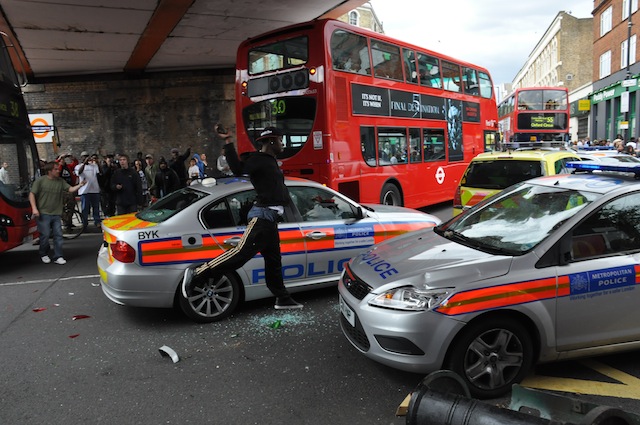
A few hours worth of pitched scuffles later, the violence in Hackney had been contained, but it had spread once again; first to Lewisham, then on to Clapham and Ealing, and even other cities across the UK. Myself, VICE editor Alex Miller, and cameraman Hugo Donkin followed the trouble. We met the Turkish shop owners in Dalston who'd united to protect their livelihoods by chasing off gangs of rioters with snooker cues, and went to Camden where we had to drive through a 200-strong crowd, some armed with axes.While the rioting in Tottenham was spawned from genuine anger, in Hackney and other towns and cities in the UK it was mainly down to opportunism. This played into the government's hands when they finally stepped in to comment, pulling out the "Broken Britain" sound bite instead of properly investigating Duggan's death or trying to deal with some of the underlying social issues that played a part in the rioting.
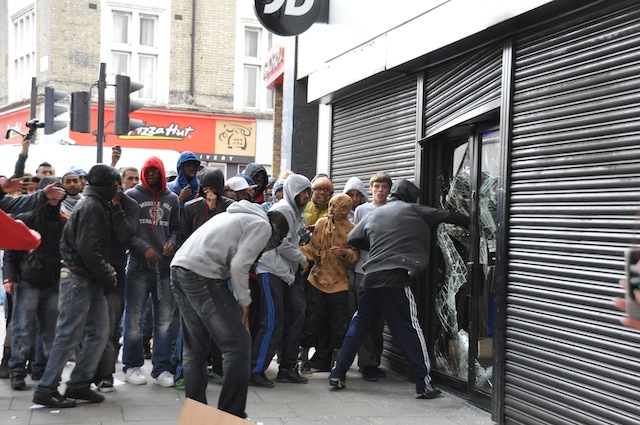
When the dust had settled, five people had died, an estimated $272 million worth of property had been damaged and 3,100 people had been arrested. In the lead up to the anniversary, many people are wondering whether we'll see anything like it again this summer. Apparently one quarter of young people seem to think so. But I'm not so sure; a lot of the rioters ended up in prison, some with long sentences for very small crimes and that sort of thing tends to put people off.
Advertisement
Then again, it'd be difficult to argue that life for young, working class people in urban areas is better than it was 12 months ago. and the police haven't exactly handled the Duggan inquest well. We'll just have to wait and see if, in years to come, the summer's remembered for burning buildings and "Broken Britain" or Olympic glory and inspired generations. Who knows, maybe it'll be both? A discus is kinda like a paving slab, right?Follow Henry on Twitter: @Henry_LangstonClick here to watch the film we made about the Hackney riots.
